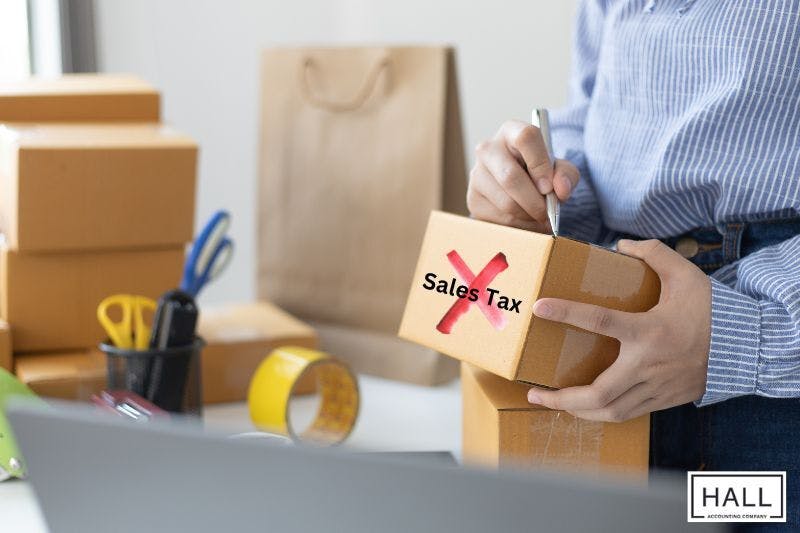
This guide aims to simplify sales tax obligations, helping readers understand essential steps and avoid costly mistakes. By answering a series of common questions, we provide helpful information on rates, exemptions, compliance tips, and filing requirements.
What is the sales tax in Dallas, and who pays it?
Sales tax is a state and local tax that supports essential services like education and infrastructure. In Texas, it combines a state tax with local city and county rates to total an effective 8.25% in Dallas. Here’s the breakdown:
Component | Rate |
Texas Sales Tax Rate | 6.25% |
Dallas Sales Tax Rate | 0.00% |
Dallas City Sales Tax | 1.00% |
Dallas area Transit Authority Tax | 1.00% |
Combined Sales Tax Rate | 8.25% |
Dallas overlaps with a number of other counties (Collin, Denton, Kaufman, and Rockwell Counties) but the sales tax rate for each one is 0%. The Texas Comptroller provides a helpful online resource, the Sales Tax Locator, where you can search for sales tax rates by address.
Why must sales tax be collected?
The need to collect sales in Texas is based on businesses having a significant connection to the state. This concept is called nexus. For Dallas, sales tax nexus rules align with Texas's general requirements: physical nexus and economic nexus.
Physical Nexus: A business has nexus if it has a physical presence in Dallas, like an office, warehouse, or employees.
Economic Nexus: Texas mandates economic Nexus if sales exceed $500,000 in the state within 12 months. This requires collecting and remitting Dallas sales tax on applicable sales, even if the business isn’t physically located in Texas.
Who must collect and remit sales tax?
All businesses selling taxable goods and services in Dallas must register for a sales tax permit, collect sales tax, and remit them regularly. In many cases, sales tax is collected at the point of purchase. However, there are exceptions to this rule:
Goods purchased for resale can be purchased tax free, as the reseller will collect retail sales from the consumers.
Goods purchased by tax exempt organizations such as non-profits, schools, and government agencies.
Certain goods purchased remotely via phone, online, or mail order may not require the seller to collect sales tax.
Do online sales require Dallas sales tax?
For sales to Dallas customers, yes. However, out-of-state transactions may differ.
What products are exempt from sales tax in Dallas?

Texas state sales tax exemptions are granted to items that are considered food, and essential items. Below is a small sample of non-taxable items:
Exempt Product | Description |
Nutritional or Dietary supplements | Herbal and mineral products and vitamins |
Meat, poultry, and fish | Canned, dried, and deli meats |
Groceries | Eggs, Fruits, Vegetables |
Dairy products | Butter, milk, and milk substitutes |
Bakery items | All items sold at a convenience store, or grocery store |
Condiments and spices | Herbs, ketchup, and sauces |
Beverages | Water, coffee, tea, fruit juice, and vegetable juice |
Grains | Rice, pasta |
Baby products | Diapers, baby food, and milk (canned, dry, packaged) |
Feminine hygiene products | Tampons, sanitary towels, and menstrual cups |
Over the counter medicine | Approved by the FDA |
Sales tax compliance
Sales tax compliance isn’t optional in Dallas. It is a legal obligation and when managed well it protects your business from penalties and builds customer confidence. The Texas Comptroller regularly audits businesses and non-compliance can lead to back taxes and interest charges. What follows are easy steps to help you manage your sales tax obligations.
How can you get a sales tax permit in Dallas?
You can get a Texas Sales Tax permit by applying online with the Texas State Comptroller.
You should allow between 2-3 weeks for your permit to arrive. This application should be completed if:
You are engaged in business in any Texas cities;
You sell or lease tangible personal property in Texas; or
You sell taxable services in Texas.
Taxpayers are notified by letter after the application has been approved, whether they will file and pay sales taxes monthly or quarterly.
For monthly filers - reports are due on the 20th of each month following the reporting month. For example, the November state sales report is due on December, 20.
- For quarterly filers - reports are due on:
April 20 to report Jan. – March
July 20 to report April – June
Oct. 20 to report July – Sept
Jan. 20 to report Oct. – Dec
What should you do if you’ve missed a sales tax filing deadline?
You should act quickly—Texas allows some flexibility for first-time missed filings. Contact the Comptroller’s office and consider consulting a Dallas CPA for support with late filings to minimize penalties.
_________________________________________________________________
With comprehensive management of sales tax compliance, you can have better business foresight. This foresight enables financial planning and resource allocation. Call Hall Accounting Company today. We have a strong senior tax associate team that can assist you in managing your overall tax strategy across different jurisdictions.
________________________________________________________________________
What are the most common sales tax mistakes?

There are a number of sales tax mistakes that businesses make, avoiding them requires understanding about basic Texas state tax rules and regulations.
Misclassifying items: Charging sales tax on exempt items or failing to tax certain taxable goods.
Lacking valid exemption certificates: Even if your business is tax-exempt, you must have the appropriate documentation from the recognized authority. This certificate will be required during an audit.
Missing filing deadlines: Frequent delays in remittance, will lead to penalties, increasing the tax liability. This is a common mistake for new businesses.
Overlooking local rates: Dallas County businesses often sell across multiple localities, each with unique tax rates. Applying Dallas’s 8.25% rate to non-local sales can cause discrepancies. Consider tax automation software if your business handles out-of-city sales.
What can you do to prevent sales tax mistakes?
There are several solutions you can apply to avoid making costly sales tax mistakes. Here are our suggestions:
Work with an accounting firm that will give you expert advice on state and local sales tax. They will help you organize your records, automate all your sales transactions, and advise whether digital purchases qualify for taxes, locally and across state lines. They usually have software, specifically developed to consolidate all your accounting functions, including sales tax, and pull together your books and get you ready to pay not only sales tax but meet your personal and tax obligations as well.
Update your POS system regularly. Tax rates change. Updating your POS settings annually can prevent errors, ensuring compliance and simplifying audits.
Know Your Filing Dates: The Texas Comptroller’s office sets strict filing schedules. Missing these dates can result in fees, so setting automated reminders helps ensure timely submissions.
________________________________________________________________
Ready to simplify your tax process?
At Hall Accounting Company, we’re dedicated to helping Dallas businesses with customized tax solutions that save time, reduce errors, and optimize compliance. Whether you need guidance on exemptions, remittances, or audit preparation, our experienced tax professionals are here to help. Get a quote now, or give us a call.
________________________________________________________________
Concluding Thoughts
Sales tax compliance doesn’t have to be a headache. With this basic guide and resources like the Texas Comptroller, you are on the right path to understanding state and local sales taxes. Furthermore, by following our three easy steps to prevent sales tax mistakes - you can overcome sales tax challenges, and if you need any additional help, you can reach out to us anytime!